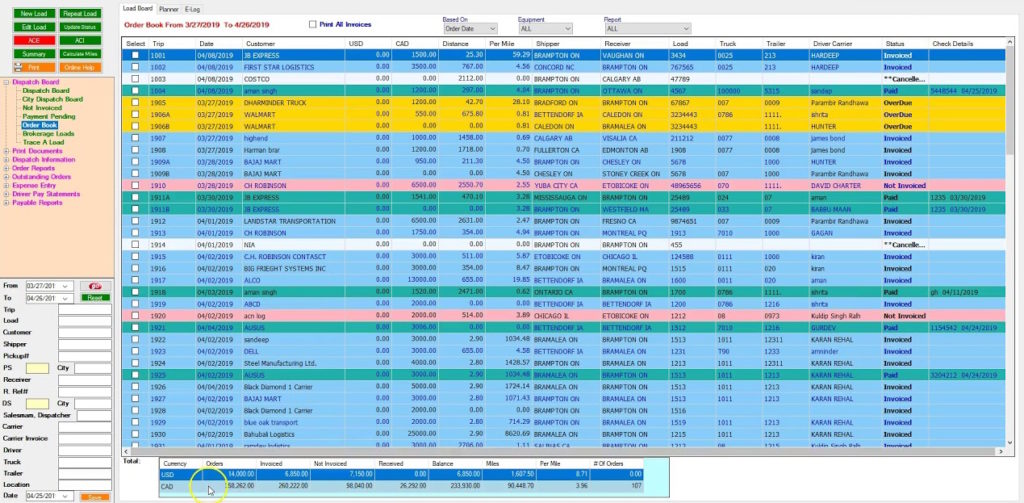Load board services, also known as freight matching platforms or freight load boards, are online marketplaces that connect shippers and brokers with available trucking capacity. These digital platforms act as intermediaries, facilitating the exchange of information between carriers (trucking businesses) and customers who need their goods transported. The primary purpose of load board services is to streamline the process of matching available loads with trucking capacity, thereby maximizing efficiency in the transportation industry.

These platforms provide a centralized hub where shippers and brokers can post available loads, specifying details such as origin/destination locations, load type, weight, equipment requirements, and desired delivery dates. On the other side, carriers can search for suitable loads based on their equipment capabilities and preferred routes.
Load boards work on a subscription-based model or charge per transaction basis for their services. By leveraging technology and data analytics, these platforms aim to optimize the allocation of resources within the trucking industry.
Importance of Finding Lucrative Loads for Trucking Businesses

For trucking businesses to thrive in today’s competitive landscape, it is crucial to find lucrative loads that offer favorable rates and maximize revenue potential. Profitability in the transportation industry heavily relies on effectively utilizing resources such as fuel, time, equipment, and workforce. Identifying high-paying loads that align with a carrier’s operational capacities can significantly impact their bottom line.
By leveraging load board services, trucking businesses gain access to an extensive network of available loads across various industries and geographic regions. This broad reach allows carriers to explore diverse opportunities beyond their usual customer base while ensuring their trucks remain loaded throughout their routes.
Moreover, finding lucrative loads through load boards helps reduce empty miles or deadhead miles – when a truck travels without cargo – which are both financially wasteful for carriers and environmentally unsustainable. Load boards enable carriers to minimize empty miles by matching them with loads that fit within their planned routes, enhancing operational efficiency and profitability.
Overview of How Load Board Services Work
Load board services operate on user-friendly online platforms that leverage cutting-edge technology to facilitate load matching. Carriers are required to create an account and provide details about their trucking business, including equipment capabilities, certifications (such as hazardous materials endorsements), insurance information, and contact details. Once registered, carriers can access the load board’s database of available loads.
Through advanced search features and filters, carriers can refine their searches based on specific criteria such as origin/destination locations, trailer types or equipment requirements (flatbeds, refrigerated trailers), payment terms, and more. The platform then displays a list of load options meeting the carrier’s specified criteria.
Carriers can review detailed information about each load listed, including the shipper/broker’s contact details, load specifications (weight, dimensions), pickup/delivery timelines, compensation rates or negotiation options. Carriers can also view customer reviews or ratings for the shipper/broker if available on the platform.
Once a carrier finds a suitable load that meets their requirements and preferences in terms of compensation and viability within their operations’ scope, they can initiate contact with the shipper/broker through the provided communication channels – either through direct messaging or provided phone numbers – to further discuss logistics and negotiate contract terms. Overall, load board services simplify the process of finding lucrative loads for trucking businesses by providing a centralized platform for efficient communication between carriers and customers seeking transportation services.
Understanding the Trucking Industry

The trucking industry serves as the lifeblood of our economy, facilitating the movement of goods and ensuring the supply chain remains intact. It plays a vital role in connecting manufacturers, distributors, and retailers by transporting their products to various destinations across the country.
This industry is responsible for delivering everything from essential commodities like food and medical supplies to consumer goods and raw materials for manufacturing. Without a robust trucking sector, businesses would struggle to meet demand, causing significant disruptions to our daily lives.
Various Types of Trucking Businesses
Within the trucking industry, there exists a diverse range of businesses catering to specific needs and niches. Owner-operators are independent drivers who own and operate their trucks, offering flexibility but also facing unique challenges such as securing consistent loads and handling administrative tasks on their own. Small fleets typically consist of several trucks operated by a single company or family-owned business; they benefit from increased scale but must grapple with competition from larger carriers.
Large carriers form another segment within this industry, incorporating extensive fleets that span regional or national territories. These companies often have established contracts with major shippers but must contend with managing complex logistics networks efficiently.
The Challenges of Finding Profitable Loads
Finding lucrative loads is an ongoing challenge for trucking businesses across all segments. The dynamics of supply and demand constantly fluctuate in response to economic conditions, seasonal demands, shifts in consumer behavior, and market trends.
This volatility can create imbalances in load availability that make it difficult for truckers to secure high-paying loads consistently. Moreover, factors like competition from other carriers vying for profitable loads can further intensify these challenges.
Additionally, smaller operators may face obstacles accessing load opportunities due to limited resources or lack of established relationships with shippers or freight brokers. In this competitive landscape, trucking businesses must navigate these obstacles strategically to maintain profitability and sustainability.
This is where load board services play a crucial role, offering a platform that connects carriers with available loads efficiently and effectively. By leveraging load board services, trucking companies can overcome these challenges and maximize their earning potential in the industry.
Benefits of Using Load Board Services
Access to a vast network of available loads across different industries and locations
Load board services provide trucking businesses with a remarkable advantage by granting them access to an extensive network of available loads across various industries and locations. These platforms act as a virtual marketplace, connecting shippers or brokers who need their cargo transported with trucking companies ready to take on the job.
The vast range of loads available ensures that trucking businesses can find suitable opportunities regardless of their specialization or preferred routes. For example, a small carrier specializing in refrigerated transportation can easily find loads requiring temperature-controlled trailers through load board services.
Likewise, an owner-operator looking for local hauls can quickly locate nearby shipments that match their preferred criteria. This access to a diverse array of loads enables trucking businesses to explore new markets, expand their customer base, and maintain consistent cash flow throughout the year.
Real-time updates on load availability, rates, and customer reviews
One of the most significant benefits offered by load board services is the provision of real-time updates on load availability, rates, and customer reviews. These updates ensure that trucking businesses are well-informed when making decisions about which loads to accept or reject.
By accessing up-to-date information on load availability, companies can make efficient use of their assets and minimize downtime. Load board services also provide valuable insights into prevailing market rates for different types of shipments.
This ensures that trucking businesses have an accurate understanding of pricing trends and can negotiate fair compensation for their services. Moreover, customer reviews and ratings help in evaluating the reliability and professionalism of shippers or brokers before accepting any load offers.
This feedback allows trucking companies to select partners who have proven track records in terms of timely payments and cooperative relationships. With these real-time updates available at their fingertips through load board platforms, trucking businesses gain a competitive edge, allowing them to make informed decisions that maximize their profitability and efficiency.
Increased efficiency in load matching and reducing empty miles
Load board services play a crucial role in improving load matching and reducing empty miles, thereby enhancing overall operational efficiency for trucking businesses. Load boards use intelligent algorithms and advanced search functionalities to match available loads with appropriate carriers based on various criteria such as origin, destination, equipment requirements, and preferred payment terms. This efficient load matching process ensures that trucking businesses can find suitable loads quickly without wasting time on irrelevant or impractical options.
Additionally, load board services help in minimizing empty miles by identifying backhaul opportunities or nearby shipments that can be combined with existing routes. By reducing empty miles, trucking companies can optimize fuel consumption, increase revenue per mile, and contribute to the sustainability of the industry by minimizing carbon emissions.
Load board services offer an indispensable solution for mitigating the challenges associated with load matching and empty miles. By utilizing these platforms effectively, trucking businesses can achieve higher productivity levels while simultaneously reducing costs and environmental impact.
Choosing the Right Load Board Service Provider
Factors to consider when selecting a load board service provider
When it comes to choosing a load board service provider for your trucking business, several factors merit careful consideration. One of the primary concerns is the cost associated with using the platform. While it is essential to find a load board service that fits your budget, it is equally important to assess the value it offers in return.
Evaluate whether the pricing structure aligns with your business needs and growth plans. Some load boards offer tiered pricing models based on usage or subscription options tailored to different fleet sizes.
User interface and functionality are crucial aspects to examine when selecting a load board service provider. A user-friendly and intuitive platform can significantly enhance your experience and productivity.
Look for features such as advanced search filters, real-time updates, and customizable notifications that help streamline your load matching process effectively. Additionally, ensure compatibility between the load board’s interface and any existing transportation management systems (TMS) or other software you utilize within your operations.
Comparison between popular load board platforms
To assist you in making an informed decision, let’s compare three popular load board platforms: DAT, Truckstop.com, and 123Loadboard. DAT (Dial-A-Truck) is one of the oldest and most well-established names in the industry.
It offers a comprehensive range of services, including loads boards, freight tracking tools, rate forecasting analytics, and more. With its extensive network of brokers and carriers nationwide, DAT provides a reliable source for finding lucrative loads across various industries.
Truckstop.com boasts an innovative online marketplace that connects carriers with shippers efficiently. Its platform includes not only load boards but also fuel pricing tools, freight visibility solutions, rate negotiation features through its Rate Analysis Tool (RAT), among others.
Truckstop.com has gained popularity due to its user-friendly interface and robust customer support. 123Loadboard is a relatively newer entrant in the market but has quickly gained recognition for its modern and intuitive platform.
It offers unique features like load searching through an interactive map, integrated weather forecasts, and fuel optimization tools. 123Loadboard also provides access to valuable information such as credit scores and days-to-pay for brokers, enabling carriers to make informed decisions.
Testimonials from successful trucking business owners
Hearing from those who have successfully utilized load board services can provide valuable insights into the benefits they offer. Here are a couple of testimonials:
John Smith, owner of ABC Trucking, shares his experience: “Using a reliable load board service like DAT has been a game-changer for my business. The wide range of available loads has allowed me to keep my trucks moving efficiently, maximizing our revenue potential.
The platform’s user-friendly interface and excellent customer support have made it easy to find lucrative loads that perfectly match our equipment capabilities.”
Jane Doe, CEO of XYZ Carriers, praises Truckstop.com: “We switched to Truckstop.com after struggling with outdated load boards that didn’t offer real-time updates or reliable customer support. Since making the change, we’ve seen significant improvements in our load matching process and overall operational efficiency.
The platform’s advanced features and integration options have helped us streamline our operations while ensuring top-notch service for our customers.” These testimonials highlight the positive impact of utilizing reputable load board services on trucking businesses’ profitability and productivity.
Navigating Load Board Platforms Effectively
Registration Process and Creating an Attractive Profile for Your Trucking Business
Navigating load board platforms effectively begins with a smooth registration process and creating an attractive profile for your trucking business. The registration process usually involves providing basic information such as company name, contact details, and location.
Additionally, you may need to submit necessary documents like your Motor Carrier (MC) number, USDOT number, or insurance information. Once registered, it is crucial to create an appealing profile that highlights your equipment capabilities and certifications.
This allows potential shippers to understand the unique value your trucking business brings to the table. For instance, if your trucks are equipped with specialized trailers such as refrigerated units or flatbeds, make sure to emphasize these capabilities in your profile.
Furthermore, if you hold relevant certifications like a hazmat endorsement that enables you to transport hazardous materials safely and legally, be sure to highlight this expertise. By showcasing these qualifications upfront, you increase the likelihood of attracting shippers who specifically require these services.
Showcasing Positive Customer Reviews or Ratings If Available
In the competitive world of trucking business, positive customer reviews and ratings can significantly enhance your credibility on load board platforms. If available, it is essential to showcase these reviews prominently in your profile. Positive feedback from satisfied customers not only demonstrates a track record of reliability but also instills confidence in potential shippers who are looking for trustworthy carriers.
To effectively showcase customer reviews or ratings on load board platforms: 1) Request feedback from satisfied customers after successful deliveries.
2) Ask customers if they would be willing to provide testimonials that highlight their positive experiences working with your trucking business. 3) Display these testimonials prominently on your load board platform profile.
4) If there is an option for rating systems on the platform itself or through external review websites, encourage customers to rate your services and leave positive reviews. By including these endorsements in your profile, you build trust and differentiate yourself from competitors.
Shippers seeking reliable carriers will be more likely to choose a trucking business with a proven track record of customer satisfaction. Remember, positive customer reviews can be the deciding factor in securing lucrative loads for your trucking business on load board platforms.
Advanced Search Techniques on Load Boards
Utilizing filters to refine search results based on criteria such as:
1) Preferred origin/destination locations
When using load board services, one of the most useful features is the ability to filter loads based on preferred origin and destination locations. By specifying the areas you prefer to operate in, you can narrow down your search results to find loads that align with your business’s logistical capabilities and minimize deadhead miles.
Whether you specialize in regional or long-haul operations, being able to pinpoint load opportunities within specific geographic regions can greatly enhance your profitability. This feature is particularly beneficial for trucking companies that want to focus their resources within a particular market or target a specific region for cost-efficiency purposes.
2) Specific trailer types or equipment requirements
Another crucial aspect of advanced search techniques is the ability to filter loads based on specific trailer types or equipment requirements. By selecting appropriate equipment filters such as flatbeds, refrigerated trailers, dry vans, or specialized trailers like tankers or auto carriers, you can refine your search results and identify loads that match the unique specifications of your fleet.
This allows you not only to optimize asset utilization but also increases your chances of securing high-paying loads that require specialized equipment. With this level of precision in load matching, trucking businesses can maximize efficiency by reducing downtime and increasing revenue potential.
3) Desired payment terms
Load board services also provide the option to filter loads based on desired payment terms. This feature enables trucking businesses to prioritize opportunities that align with their financial objectives and cash flow management strategies.
Whether you prefer quick pay options for faster access to funds or seek longer payment terms for steady cash flow over time, being able to filter loads based on payment preferences empowers trucking companies with greater control over their financial operations. By selecting the payment terms that best suit your business needs, you can optimize your cash flow and ensure a healthier bottom line.
Conclusion
The use of load board services, combined with advanced search techniques, revolutionizes the way trucking businesses find lucrative loads. By utilizing filters to refine search results based on preferred origin/destination locations, specific trailer types or equipment requirements, and desired payment terms, trucking companies can maximize their efficiency and profitability. These advanced search techniques provide a level of precision that allows businesses to tailor load opportunities to their unique operational capabilities and financial objectives.
With load board services at their fingertips, trucking businesses can navigate the ever-evolving logistics landscape with ease and confidence. The ability to find lucrative loads efficiently not only increases revenue potential but also optimizes asset utilization and reduces empty miles.
By embracing these advanced search techniques offered by load board platforms, trucking businesses are empowered to thrive in an industry that demands adaptability and strategic decision-making. So go forth with these tools at your disposal, confident in your ability to find profitable loads and steer your trucking business towards success!










